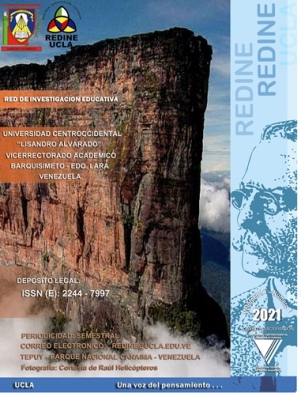La filosofía de la matemática y sus objetos matemáticos
Palabras clave:
objetos matemáticos, platonismo, estructuralismo, intuicionismoResumen
El presente artículo se propone exponer los diferentes puntos de vistas sobre la naturaleza de los objetos matemáticos como entidades en lo ontológico y como teorías desarrolladas en la filosofía de la matemática desde el punto de vista del platonismo surgida en su idea fuente y en contraparte del anti-platonismo como teoría alterna que la refuta. Se aborda la confrontación ontológica de la matemática enfocada entre el platonismo y el estructuralismo, las dos corrientes principales de la filosofía de la matemática que se debaten sobre la presencia y la naturaleza de los objetos matemáticos.
Descargas
Citas
Balaguer, M. (2009). Realism y Anti-realism in Mathematics. En Gabbay, M., Thagard, P. and Woods, J. Handbook of the Philosophy of Science. Philosophy of Mathematic. Disponible: https://www.calstatela.edu/sites/default/files/groups/Department%20of%20Philosophy/realism_and_anti-realism_in_mathematics.pdf
Beziau, J. (2000). Logical Autobiography 50. University of Brasil. Rio de Janeiro. Disponible: http://www.jyb-logic.org/papers/lauto50.pdf
Bremer, M. (2010). Contradiction in Mathematics. En Benedikt, T. (Ed), philosophy of Mathematics: Sociological aspects and Mathematical practice. College Publications. Disponible: http://www.lib.uni-bonn.de/PhiMSAMP/Data/Book/PhiMSAMP-bk_Bremer.pdf
Bueno, O. (2013). Putam and Indispensability of Mathematics. University of Miami. Disponible: https://miami.pure.elsevier.com/en/publications/putnam-and-the-indispensability-of-mathematics
Bueno, O. (2016). An Anti-realist account of the application of mathematics. Philos Stud. Springer. Disponible: https://pdfs.semanticscholar.org/0389/2a6301367e717c6d23ccc61730d4968f600a.pdf
Burgess, J. (2010). Parsons and the Structuralist view. Princetone University. Disponible:https://www.princeton.edu/~jburgess/ParsonsStructuralism.pdf
Callard, B. (2007). The Conceivability of Platonism. Philosophy Mathematic Vol. 15. No.3. Oxford University Press. Disponible: https://pdfs.semanticscholar.org/b745/5e6a56652b90d6dae53cffbabdb0551dd9ec.pdf
Capozzi, M. y Roncaglia, G. (2009). History and Philosophy of Logic from Humanis to Kant. En Leila Haaparanta (ed.), The Development of Modern Logic. Oxford University Press. Disponible: https://philpapers.org/rec/CAPLAP
Colyvan, M., (2006). Applying Inconsistent Mathematics, University of Sidney. Australia. Disponible: http://www.colyvan.com/papers/aim.pdf
Corfield, D. (1997). Assaying Lakato´s philosophy of mathematics. Disponible:https://www.sciencedirect.com/science/article/abs/pii/S0039368196000027
Dummett, M. (1973). Frege: Philosophy of Language. Harper & Row Publishers. New York. Disponible: https://academiaanalitica.files.wordpress.com/2016/10/michael-dummett-frege-philosophy-of-language.pdf
Ernest, P. (2007). The Philosophy of Mathematics, Values and Keralese Mathematics. The Montana Mathematics Enthusiast. Vol. 4 No. 2. UK. Disponible: https://scholarworks.umt.edu/cgi/viewcontent.cgi?article=1069&context=tme
Field, H. (1980). Science without numbers. A defense of Nominalism. Princeton University Press. Princeton, New Jersey. Disponible: http://www.thatmarcusfamily.org/philosophy/Course_Websites/Readings/Field%20-%20SWN%20selections.pdf
Field, H. (1992). A nominalistic proof of the conservativeness of Set Theory. Disponible: https://www.jstor.org/stable/30226470?seq=1#page_scan_tab_contents
Font, V., Godino, J. y Gallardo, J. (2012). The emergence of objects from mathematical practices. Educational studies in Mathematics. Disponible: https://pdfs.semanticscholar.org/159a/d667dd2f3f20331d9b42a4e25f78424e39fc.pdf
Friedman, M. (2006). Carnap and Quine : Twentieth Century echoes of Kant and Hume. En Analytic Kantianism . Philosophic Topic. Vol. 34 Nro. 1 y 2. Disponible: https://www.jstor.org/stable/43155410?seq=1#page_scan_tab_contents
Gray, J. (2007). Worlds out of Nothing. Springer Verlag. London.
Gullberg, E. (2011). Objects and Objectivity Alternatives to Mathematical Realism. Umea University. Sweden. Disponible: http://www.diva-portal.org/smash/get/diva2:415209/FULLTEXT01.pdf
Heller, M. (2006). Discovery the World Structure as goal of Physics. Pontificial Academic of Sciences. Acta 18. Vatican City. Disponible: http://www.pas.va/content/dam/accademia/pdf/acta18/acta18-heller.pdf
Hodesdon, K. (2013). Mathematical Representation: playing a role. Conference on the Philosophy of logic and Mathematic at Cambridge University. Disponible: https://philarchive.org/archive/HODMRP-3
Irvine, A. (1996). Philosophy of Logic. En Shanker, S. (Ed.) Philosophy of Science, Logic and Mathematics in the Twentieth Century. Routledge. New York.
Koss, M. (2013). Semantic and Mathematic Foundations for Intuitionism . Indiana University. Disponible: https://scholarworks.iu.edu/dspace/bitstream/handle/2022/17935/Koss_indiana_0093A_12346.pdf;sequence=1
Lower, B. Muller, T y Wilhelmus, M (2010). Mathematical Knowledge: a case study in empirical philosophy of mathematic. Disponible: https://www.researchgate.net/publication/48319172_Mathematical_knowledge_as_a_case_study_in_empirical_philosophy_of_mathematics
MacFarlen, G. (2000). What does it mean to say that logic is formal?.Dissertation Doctoral. University of Pittsburg . Disponible: https://johnmacfarlane.net/dissertation.pdf
Mancosu, P. (2008). The Philosophy of Mathematic Practice. Oxford University Press. New York.
Maloney, M. (2006). Constructivism: A realistic Approach Math. The University of Chicago. Disponible: https://pdfs.semanticscholar.org/b7f9/b4be41bfb668395153cc0e5a3da22d49a70f.pdf
Parsons, C. (1990). The Structuralist view of Mathematic Objects. Synthese. Kluwer Academic Plubishers. Netherlands. Disponible: https://link.springer.com/article/10.1007/BF00485186
Parsons, C. (2008). Mathematical Thought and its Objects. Cambridge University Press. Disponible: https://philpapers.org/rec/PARMTA-2
Restall, Greg. (2006). Logic. An Introduction. Routledge. London.
Rieger, A. (2008). Paradox , ZF, and the axiom of foundation. En Clark, P. and Hallett, M. and DeVidi, D. (Eds). Vintage Enthusiasm: Essays in honour of of J. L. Bell. University of Glasgow. Disponible: https://pdfs.semanticscholar.org/5bd1/c8264bbee19da132a795b1faa9a9595bbacc.pdf
Rodin, A. (2012). Axomatic Method and Category Theory. Disponible: https://arxiv.org/abs/1210.1478
Rodin, A. (2006). Toward Hermeneutic Categorical Mathematics. Ecole Normale Superieure. Disponible: http://philsci-archive.pitt.edu/2894/1/Interpretation.pdf
Ruiz, A. (1990). Matemática y Filosofía. Estudios Logicistas .Editorial de la Universidad de Costa Rica.
Salgado, S. (2011). Bertrand Russell: Un viaje a los fundamentos de la verdad. Cuadernos de Filosofía Dureiras. Disponible: https://es.slideshare.net/WilliamAlfredoLudea/bertrand-russell-un-viaje-a-los-fundamentos-de-la-verdad
Sereni, A. y Panza, M. (2015). On the Indispensable Premises of the Indispensability Argument. En Lolli. G,. Panza, M., Venturi, G. (Eds) Logic and Practice Italian studies in the Philosophy of Mathematics. Springer. Disponible: https://www.researchgate.net/publication/278757640_On_the_Indispensable_Premises_of_the_Indispensability_Argument
Shapiro, S. (2007). The Oxford Handbook of Philosophy of Mathematic and Logic Disponible: http://citeseerx.ist.psu.edu/viewdoc/download?doi=10.1.1.464.6584&rep=rep1&type=pdf
Strawson, P. (1975). Los límites del sentido. Ensayo sobre la Critica de la Razón Pura de Kant. Ediciones de la Revista de Occidente. Madrid.
Trobok, M. (2008). A Structuralist Account of Logic. Croatian Journal of Philosophy. Vol. VIII No.23. Disponible: https://www.researchgate.net/publication/255608702_A_Structuralist_Account_of_Logic
Von Bulow, C. (2009). Shapiro´s and Hellman´s Structuralism. Disponible:https://www.researchgate.net/publication/255929155_Shapiro's_and_Hellman's_Structuralism
Publicado
Cómo citar
Número
Sección
Derechos del/de autor/es a partir del año de publicación
Esta obra está bajo la licencia:
Creative Commons Reconocimiento-NoComercial-CompartirIgual 4.0 Internacional (CC BY-NC-SA 4.0)
Las opiniones expresadas por los autores no necesariamente reflejan la postura del editor de la publicación ni de la UCLA. Se autoriza la reproducción total o parcial de los textos aquí publicados, siempre y cuando se cite la fuente completa y la dirección electrónica de esta revista. Los autores(as) tienen el derecho de utilizar sus artículos para cualquier propósito siempre y cuando se realice sin fines de lucro. Los autores(as) pueden publicar en internet o cualquier otro medio la versión final aprobada de su trabajo, luego que esta ha sido publicada en esta revista.




